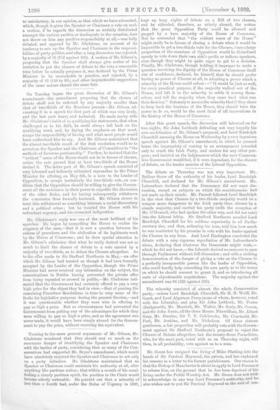Mr. Gladstone's reply was one of the most brilliant of
his speeches. He began by compelling the House to realise the exigency of the case,—that it is now a question between the reform of procedure, and the abdication of its legitimate work by the House of Commons ; and he drew special attention to Mr. Gibson's admission that what he really desired was not so much to limit the closure of debate to a vote carried by a majority of two-thirds, as to defeat the Closure altogether. As to the offer made to Sir Stafford Nortlicote in May,—an offer which Mr. Gibson had treated as though it had been formally accepted by the Leader of the Opposition, though the Prime Minister had never received any intimation on the subject, the assassinations in Dublin having prevented the private offer from being repeated or avowed in public,—Mr. Gladstone inti- mated that the Government had certainly offered to pay a very high price for the object they had in view,—that of passing the remaining Procedure Resolutions in time to reap some of the fruits for legislative purposes during the present Session,—and it was questionable whether they were wise in offering to pay so high a price. But as circumstances had prevented the Government from getting any of the advantages for which they were willing to pay so high a price, and as the agreement was never made, it would have been simply absurd for the Govern- ment to pay the price, without receiving the equivalent.


































 Previous page
Previous page